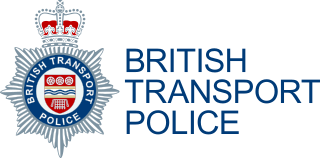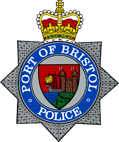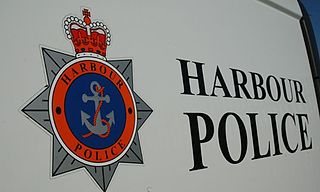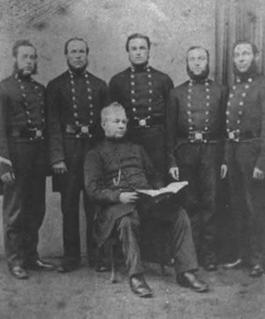
The British Transport Police is a national special police force that polices railways and light-rail systems in England, Wales and Scotland, for which it has entered into an agreement to provide such services. The force is funded primarily by the rail industry, and does not receive central government funding. British Transport Police officers do not have jurisdiction in Northern Ireland unless working under mutual aid arrangements for the Police Service of Northern Ireland, in which case any duties performed on a railway will be merely incidental to working as a constable in Northern Ireland.

Transit police are specialized police agencies employed either by a common carrier or a municipality, county, district, or state. Transit law enforcement services may also be provided by a specialized unit within a larger local law enforcement agency. Their mandate is to prevent and investigate crimes committed against the carrier or by or against passengers or other customers of the carrier, or those committed on the carrier's property.
Chief constable is the rank used by the chief police officer of every territorial police force in the United Kingdom except for the City of London Police and the Metropolitan Police, as well as the chief officers of the three 'special' national police forces, the British Transport Police, Ministry of Defence Police, and Civil Nuclear Constabulary. The title is also held by the chief officers of the principal Crown Dependency police forces, the Isle of Man Constabulary, States of Guernsey Police Service, and States of Jersey Police. The title was also held, ex officio, by the president of the Association of Chief Police Officers under the Police Reform Act 2002. It was also the title of the chief officer of the Royal Parks Constabulary until this agency was disbanded in 2004.
Most of the police forces of the United Kingdom use a standardised set of ranks, with a slight variation in the most senior ranks for the Metropolitan Police and City of London Police. Most of the British police ranks that exist today were chosen by Home Secretary Sir Robert Peel, the founder of the Metropolitan Police, enacted under the Metropolitan Police Act 1829. The ranks at that time were deliberately chosen so that they did not correspond with military ranking, because of fears of a paramilitary force.

Avon and Somerset Police is the territorial police force responsible for law enforcement in the county of Somerset and in four districts that used to be in the defunct county of Avon: Bristol, Bath and North East Somerset, North Somerset and South Gloucestershire.

Devon and Cornwall Police is the territorial police force responsible for policing the ceremonial counties of Devon and Cornwall in England. The force serves approximately 1.8 million people over an area of 3,967 square miles (10,270 km2).

The Belfast Harbour Police is a small, specialised ports police force, with responsibility for the Port of Belfast, Northern Ireland. It was founded in 1847, making it the oldest continuously-operating law enforcement agency on the island of Ireland.

The Port of Dover Police (PoDP) is a non-Home Office ports police force which provides a 24-hour policing service to the Port of Dover, Kent, England.

The Port of Bristol Police (PoBP) is a ports police force with responsibility to protect the port complexes and community situated at the mouth of the River Avon on the border between Bristol and Somerset. Officers are attested under powers in legislation derived from the Harbours, Docks and Piers Clauses Act 1847.
The Port of Felixstowe Police is a non-Home Office ports police force established in 1975, responsible for policing the Port of Felixstowe in Felixstowe, Suffolk, United Kingdom.

Tees and Hartlepool Harbour Police is a non-Home Office ports police force responsible for Teesport, which is the UK's third largest port and is owned by PD Ports, situated along the south bank of the River Tees in north east England. The harbour police force is over 100 years old and was originally formed under the Harbour, Docks and Piers Clauses Act 1847.

The Port of Portland Police is a non-Home Office ports police force responsible for the Port of Portland in Dorset, United Kingdom.
A special constable or special police constable is generally an auxiliary or part-time law enforcement officer.
Liverpool Parks Police was a police force maintained by the Corporation of Liverpool to police the parks and open spaces owned by the city. The first record of "park constables" in Liverpool is from 1832, although members of the force were not sworn in as constables in their own right until 1882. The force was disbanded in 1972.
Penzance Borough Police was the police force for the borough and corporate town of Penzance, Cornwall, from 1836 to 1947. It was formed following the passing of the Municipal Corporations Act 1835, which reformed all UK boroughs, and stipulated that each appoint a Watch Committee to oversee a police force. The police force formed part of the commonality of the town's government, led by an elected Mayor, six aldermen and eighteen councillors.

Truro City Police, known as Truro Borough Police until 1877, was the police force for the corporate town of Truro, Cornwall, from 1836 to 1921. It was established under the terms of the Municipal Corporations Act 1835 which required every town to appoint a council and a Police Watch Committee, which was responsible for overseeing a police force.
Liverpool Airport Police is a defunct police force of the United Kingdom, formerly responsible for policing Liverpool John Lennon Airport, in Liverpool, England.









